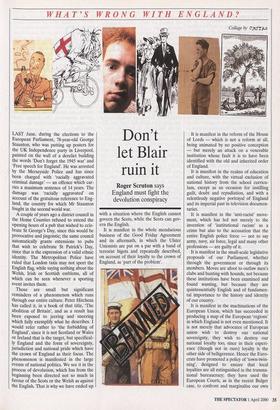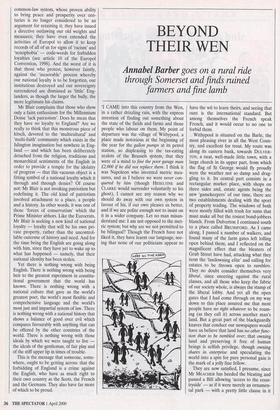WHAT'S WRONG WITH ENGLAND?
Don't let Blair ruin it
Roger Scruton says England must fight the devolution conspiracy LAST June, during the elections to the European Parliament, 78-year-old George Staunton, who was putting up posters for the UK Independence party in Liverpool, painted on the wall of a derelict building the words 'Don't forget the 1945 war' and `Free speech for England'. He was arrested by the Merseyside Police and has since been charged with 'racially aggravated criminal damage' — an offence which car- ries a maximum sentence of 14 years. The damage was 'racially aggravated' on account of the gratuitous reference to Eng- land, the country for which Mr Staunton fought in the second world war.
A couple of years ago a district council in the Home Counties refused to extend the opening hours of a pub that wished to cele- brate St George's Day, since this would be provocative and jingoistic; the same council automatically grants extensions to pubs that wish to celebrate St Patrick's Day, since that is the expression of a valid ethnic identity. The Metropolitan Police have ruled that London taxis may not sport the English flag, while saying nothing about the Welsh, Irish or Scottish emblems, all of which can be seen whenever a sporting event invites them.
Those are small but significant reminders of a phenomenon which runs through our entire culture. Peter Hitchens has called it, in a book of that title, 'The abolition of Britain', and as a result has been exposed to jeering and sneering which fully exemplify what he describes. I would refer rather to 'the forbidding of England', since it is not Scotland or Wales or Ireland that is the target, but specifical- ly England and the form of sovereignty, jurisdiction and national pride which have the crown of England as their focus. The phenomenon is manifested in the large events of national politics. We see it in the process of devolution, which has from the beginning been directed not so much in favour of the Scots or the Welsh as against the English. That is why we have ended up with a situation where the English cannot govern the Scots, while the Scots can gov- ern the English.
It is manifest in the whole mendacious business of the Good Friday Agreement and its aftermath, in which the Ulster Unionists are put on a par with a band of terrorist bigots and repeatedly described, on account of their loyalty to the crown of England, as 'part of the problem'. It is manifest in the reform of the House of Lords — which is not a reform at all, being animated by no positive conception — but merely an attack on a venerable institution whose fault it is to have been identified with the old and inherited order of England.
It is manifest in the realms of education and culture, with the virtual exclusion of national history from the school curricu- lum, except as an occasion for instilling guilt, doubt and repudiation, and with a relentlessly negative portrayal of England and its imperial past in television documen- taries.
It is manifest in the 'anti-racist' move- ment, which has led not merely to the invention of 'institutional racism' as a crime but also to the accusation that the entire English police force — not to say army, navy, air force, legal and many other professions — are guilty of it.
It is manifest in the small-scale legislative proposals of our Parliament, whether through the government or through its members. Moves are afoot to outlaw men's clubs and hunting with hounds, not because these institutions have been examined and found wanting, but because they are quintessentially English and of fundamen- tal importance to the history and identity of our country.
It is manifest in the machinations of the European Union, which has succeeded in producing a map of the European 'regions' in which England is not even mentioned. It is not merely that advocates of European union wish to destroy our national sovereignty, they wish to destroy our national loyalty too, since in their experi- ence (though not in ours) loyalty is the other side of belligerence. Hence the Euro- crats have promoted a policy of 'town-twin- ning', designed to ensure that local loyalties are all extinguished in the transna- tional bureaucracy; they have used the European Courts, as in the recent Bulger case, to confront and marginalise our own common-law system, whose proven ability to bring peace and prosperity over cen- turies is no longer considered to be an argument for retaining it; they have issued a directive outlawing our old weights and measures; they have even extended the activities of Europol to allow it to keep records of all of us for signs of 'racism' and `xenophobia' — code-words for forbidden loyalties (see article 10 of the Europol Convention, 1998). And the worst of it is that those who protest, however faintly, against the 'inexorable' process whereby our national loyalty is to be forgotten, our institutions destroyed and our sovereignty surrendered are dismissed as 'little' Eng- landers, as though the larger the bully, the more legitimate his claims.
Mr Blair complains that those who show only a faint enthusiasm for the Millennium Dome 'lack patriotism'. Does he mean that they have no loyalty to England? Are we really to think that this monstrous piece of kitsch, devoted to the 'multicultural' and Multi-faith' community which exists in the Islington imagination but nowhere in Eng- land — and which has been deliberately detached from the religion, traditions and monarchical sentiments of the English in order to provide a temple for the idolatry of progress — that this vacuous object is a fitting symbol of a national loyalty which it through and through denies? Of course not: Mr Blair is not invoking patriotism but redefining it. The old kind of patriotism involved attachment to a place, a people and a history. In other words, it was one of those 'forces of conservatism' which the Prime Minister abhors. Like the Eurocrats, Mr Blair is seeking a new kind of national loyalty — loyalty that will be his own pri- vate property, rather than the uncontrol- lable outcome of history and need. And for the time being the English are going along with him, since they have yet to wake up to what has happened — namely, that their national identity has been stolen.
Yet there is nothing wrong with being English. There is nothing wrong with being heir to the greatest experiment in constitu- tional government that the world has known. There is nothing wrong with a national culture that gave us the world's greatest poet, the world's most flexible and comprehensive language and the world's most just and impartial system of law. There is nothing wrong with a national history that shows a balance of good over evil which compares favourably with anything that can be offered by the other countries of the world. There is nothing wrong with those ideals by which we were taught to live the ideals of the gentleman, of fair play and of the stiff upper lip in times of trouble.
This is the message that someone, some- where, ought to be getting across: that the forbidding of England is a crime against the English, who have as much right to their own country as the Scots, the French and the Germans. They also have far more of which to be proud.























































































 Previous page
Previous page